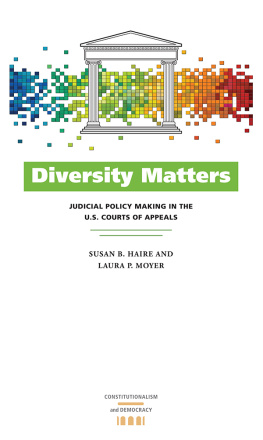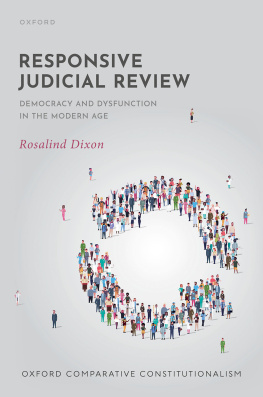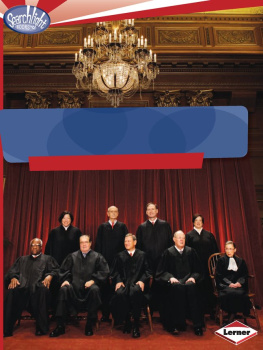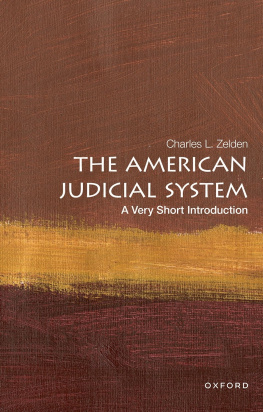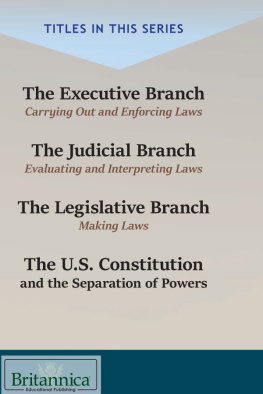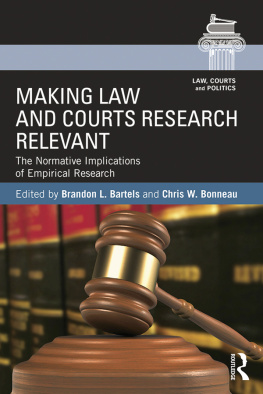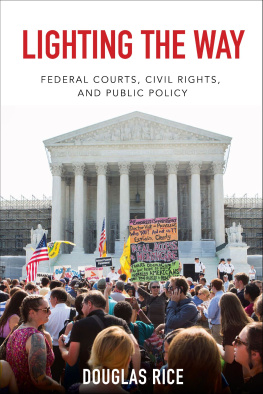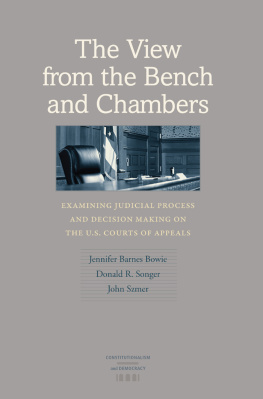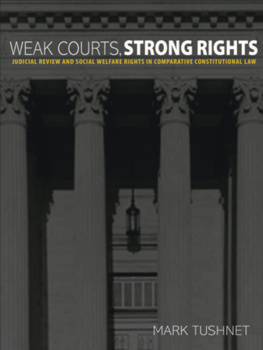University of Virginia Press
2015 by the Rector and Visitors of the University of Virginia
All rights reserved
Printed in the United States of America on acid-free paper
First published 2015
9 8 7 6 5 4 3 2 1
Library of Congress Cataloging-in-Publication Data
Haire, Susan B., author.
Diversity matters : judicial policy making in the U.S. courts of appeals / Susan B. Haire and Laura P. Moyer.
pages cm. (Constitutionalism and democracy)
Includes bibliographical references and index.
ISBN 978-0-8139-3718-2 (cloth : alk. paper) ISBN 978-0-8139-3719-9 (e-book)
1. JudgesUnited States. 2. Minority judgesUnited States. 3. Women judgesUnited States. 4. Judicial processUnited States. 5. Appellate courtsUnited States. 6. Sex discrimination against womenLaw and legislationUnited States. 7. Race discriminationLaw and legislationUnited States.
I. Moyer, Laura P., 1978 author. II. Title.
KF8775.H35 2015
347.732403408dc23
2014038396
ACKNOWLEDGMENTS
Many people helped to bring this project to fruition. At the outset, Barry Edwards provided invaluable coding assistance, cleaned existing data sets, and enhanced the efficiency and accuracy of data collection by writing a computer program that automated data collection for the expanded dataset. Excellent research assistance was also contributed by Allie Ackermann, Sara Haire, Rosalie Haug, Kerry Jones, David Hughes, Phil Marcin, and Kimberly Miller.
We appreciate the support for this project from Dick Holway of the University of Virginia Press and the series coeditors, Kevin McGuire and Gregg Ivers. In particular, we are indebted to Kevin for his helpful advice and persistence in shepherding this manuscript through the publication process.
We acknowledge those who were instrumental in generating sources of data used in this book. We thank Lee Epstein, William Landes, and Richard Posner for making available their data. Established with the support from the National Science Foundation, the Multi-User Database of the Decisions of the U.S. Courts of Appeals was also an important data source for this project. Biographical information was provided from the Federal Judicial Center, and we thank the Administrative Office of the U.S. Courts for use of a map from their web site. Librarians in the Fifth Circuit libraries in New Orleans and Baton Rouge provided generous assistance in helping us access Reynaldo Garzas oral history transcripts. Many oral histories used for this volume are from the Women Trailblazers in the Law Project, a public service program of the American Bar Associations Senior Lawyers Division and Commission on Women in the Profession. The transcripts of these interviews are available at the Manuscript Division of the Library of Congress.
Although this volume represents original research, some of our earlier scholarship inspired this project. In particular, chapter 4 expands on a version of Diversity, Deliberation, and Judicial Opinion Writing (Haire, Moyer, and Treier 2013) that appeared in the Journal of Law and Courts. Chapter 5 draws insights from Rethinking Critical Mass on the Federal Appellate Courts (Moyer 2013), which appeared in the Journal of Women, Politics, and Policy.
The comments and input of many individuals helped to strengthen our work along the way. In particular, we wish to recognize the anonymous reviewers, Shawn Treier, Donald Songer, Stefanie Lindquist, David Klein, Wendy Martinek, Todd Collins, Kevin Scott, Margaret Williams, and Susan Johnson for their constructive advice and suggestions at many stages in the project. Whatever errors remain are our own.
Haire acknowledges the support of the Department of Political Science at the University of Georgia for providing research leave, graduate research assistance, and generous colleagues, particularly John Maltese. She is also thankful to the department for providing the opportunity to meet and collaborate with many graduate students, including a remarkable scholar and person who is now her coauthor on this book. Haire is grateful for her previous service as the Law and Social Sciences Program Officer at the National Science Foundationan experience that gave her interdisciplinary insights on the subjects investigated in this book. Finally, Haire acknowledges that this project would not have been completed without the unwavering support of her parents, Mary and Chuck Brodie; inspiration provided by her daughters, Alison and Sara; and the love and (daily) encouragement from her husband, Rob.
Moyer is grateful for all those individuals who helped her to cultivate and deepen her interest in the study of identity politics, particularly Amy Lang, Vicky Wilkins, Arnold Fleischmann, Susan Haire, and Wayne Parent. She is especially grateful for the training she received from the Political Science Department at the University of Georgia, where many of the ideas for this project first emerged. Funding from the Deans Award for Social Science Research and the University of Georgia Graduate School supported dissertation research related to this project, including interviews with judges that were used in this book; Stephen Wasby was instrumental in helping to identify judges for these interviews as well sharing many resources related to circuit practices and norms. Moyer also wishes to express her deep gratitude for the institutional support she received from both Louisiana State University and the University of Louisville, including research assistance, travel funds, and summer funding through the LSU ASPIRE program. She would like to thank her colleagues from both institutions who shared their candid insights about the process of writing a book and hopes that she can one day pass this excellent advice on to others. Likewise, she is grateful for her students many perceptive observations about race and gender over the years and especially the insights of Jerel Williams. Lastly, Moyer wishes to express her indebtedness to her family for their enthusiastic support throughout her entire academic career and in this undertaking. Her parents, Sally and Charlie Moyer, have been a constant source of encouragement and generously helped make the transition to a new city a smooth one so she could continue her work without interruption. Most of all, she is grateful for her husband, Ray, who has been tireless in his commitment to her success, and for their son, Aiden, who is a daily source of joy.


